JOHN WAINE AND SONS (WILLENHALL) LTD. BRITANNIA
WORKS, LOWER LICHFIELD STREET, WILLENHALL
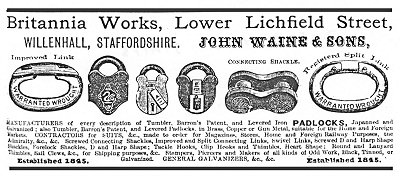 |
Founded in 1845. An advert in the Directory
of Staffordshire 1880 lists them as manufacturers of every
description of tumbler, barron’s patent and levered iron
padlocks, also in brass. |
|
They were also manufacturers of screw connecting
shackles and split connecting links, swivel links etc for shipping
purposes; and they were also general galvanisers.
In 1931 they were selling the Britannia Cylinder Night Latch, which
was made for them by George Spencer Limited.
Run by two brothers (names?). Existing in 1974. Nothing
else known.
|
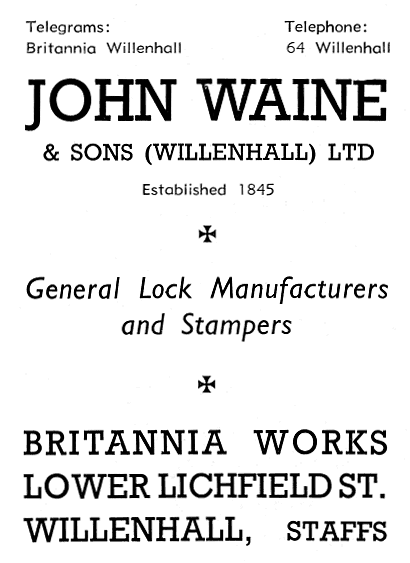
An advert from 1954. |
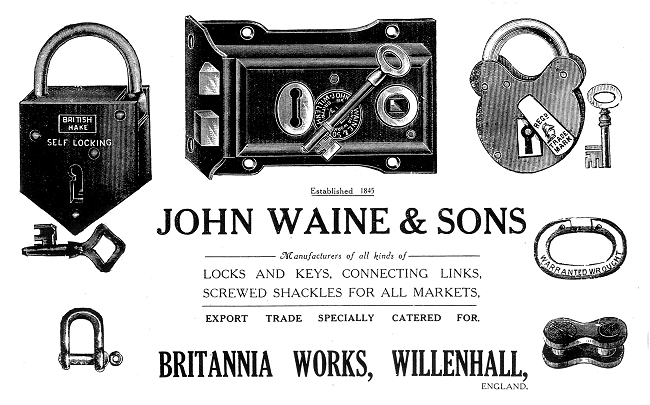
An advert from 1920.
|
|
| View pages from some old John
Waine & Sons catalogues |
 |
| |
|
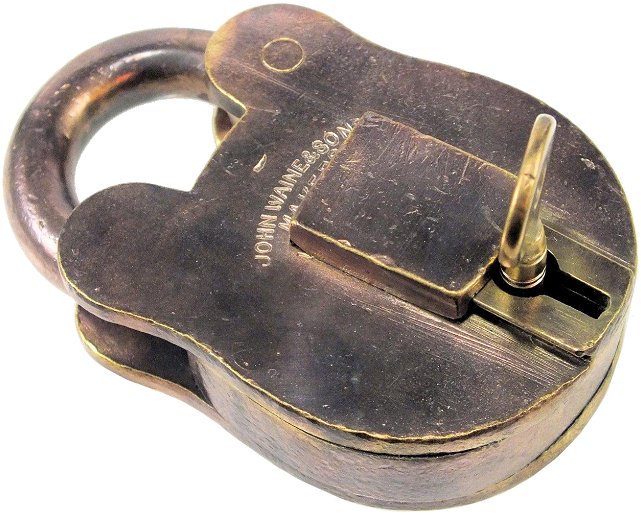
A John Waine & Sons padlock.
|
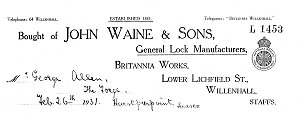 Courtesy of Trevor Dowson.
Courtesy of Trevor Dowson. |
The image (left) is of a letterhead dated 1931 but
the telephone number, "64 Willenhall" suggest an earlier
printing. |
|
The advert (left) is from the Ironmongers Guide, 1950, trade
marks section.
Presumably the head is that of Britannia
and was being used as their trade mark.
|
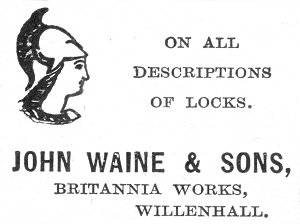
|
|
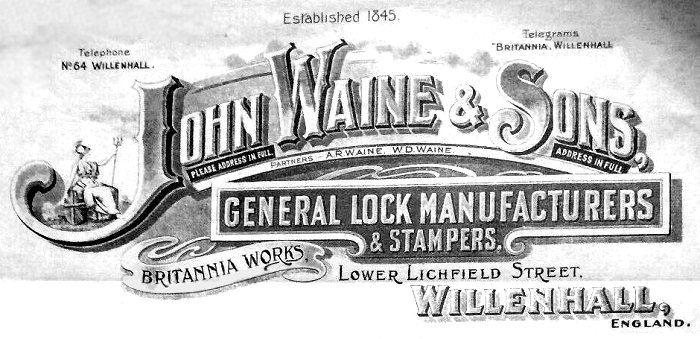
A letterhead from the late 1930s. |
JOSEPH WAINE & CO. LTD. IMPERIAL WORKS, WOOD STREET,
WILLENHALL
Joseph Waine & Co. Ltd, were general lock, latch & bolt
makers, and brass and iron founders at Imperial Works, Wood
Street, Willenhall. Joseph had three sons, John Vincent Waine,
G. A. Waine and Horace Theo Waine.
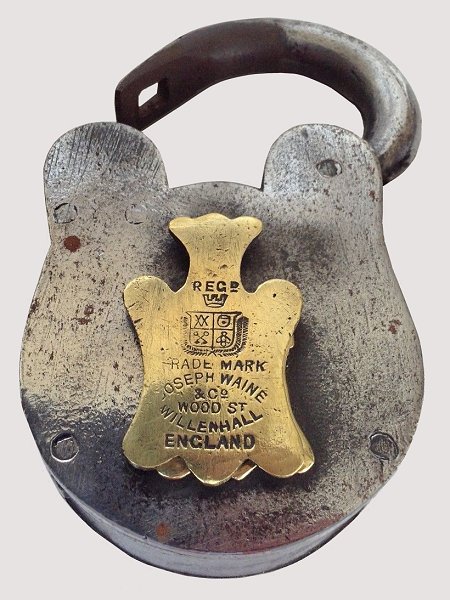 |
John Vincent Waine, and his brother G. A. Waine, started the
Vulcan Manufacturing Company at Blackheath, Birmingham, in about
1910. The company manufactured Heel Tips, Toe Plates and had the
most up to date machinery in the world. The factory turned out
288,000 pairs of heels per week, under their Vulcan brand name. The company specialised in a number of products including No. 0
and 1 York heels, 21B heels, mule & horse shoes for the Indian,
Turkish, African and South American markets, and japanned and
galvanised door bolts. A large number of other products were
produced including the following:
Brass, chromium-plated and special finishes, stainless steel,
garage bolts, cabinet bolts, shelf brackets, aluminium door and
gate latches, casement stays and fasteners, hasps and staples,
hinges, brass and steel gate and tee, gutter brackets, swivel
ties, tinned angle brackets, rim, dead and mortice locks,
latches, padlocks, stamped brassware and household soldering
sets. |
|

Courtesy of Trevor Dowson. |
The factory covered over an acre. Extensive trade was done with
the War Office, the Army and in various parts of Europe. Horace
T. Waine was also involved in the business, and due to his
international travels the products were also sold in Japan,
Burma and Egypt. The company also had an establishment in the
Potteries.
In 1913 the Directors decided to move the three factories to one
site to improve the company's efficiency. In June a large
disused works was purchased in Colliery Road, Wolverhampton and
the three factories were combined under one roof, and called the
New Griffin Works.
|
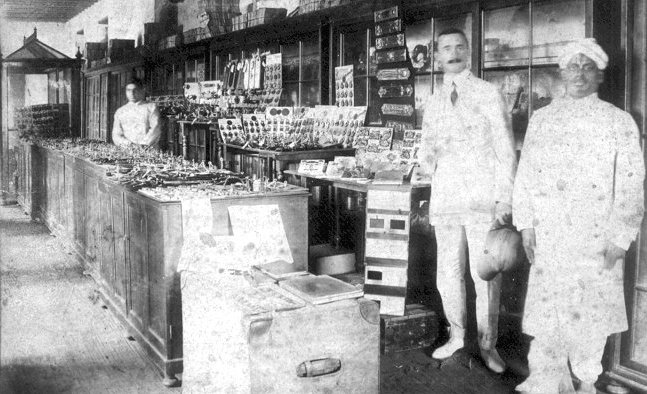
Theo Waine on a lock selling trip to
India. |
In 1928, Theo Waine and his brother Mr. G. A.Waine,
took over the Wearwell Cycle Company Limited from the liquidators of
the Wulfruna Engineering Company Limited.
Their sons, H. V. Waine and T. A. Waine were issued with one
ordinary share each, and were appointed directors at the first
shareholders meeting, which took place at the New Griffin Works.
The new company was registered as the Wearwell Cycle Company (1928)
Limited.Lock manufacture continued for some time, but
eventually the firm concentrated on the production of bicycles
and motorcycles. |
SAMUEL WAKELAM AND CO, WATERLOO PLACE,
STRINGERS LANE, WILLENHALL
Trunk, cash box and cabinet lock makers. Existing
in 1914 and 1953 but not 1970. Nothing else known.
WALSALL LOCKS AND CARTGEAR LTD, NEALE STREET,
WALSALL
|
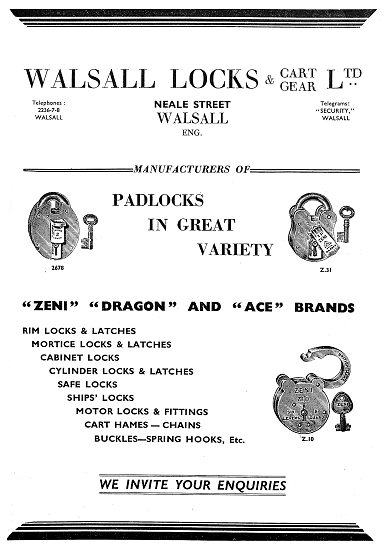
An advert from 1958. |
The company was set up in 1873 as a result of an
industrial dispute between the workers and their employers. A
demand for higher wages resulted in a lock-out with no wages earned at
all. A benefit fund was collected from donations so that the out
of work people might get some assistance while the dispute continued. £150 was raised and distributed. Mr. G. Harrison reported to the
Walsall Trades council that the £150 paid out seemed futile, for the men
were still out of work and still not earning.
Why was not the
money raised used to set the workers up in their own workshops and
become self employed? And so Walsall Lock and Cart Gear was
formed.
Known as the Walsall Padlock Society in 1879, it adopted
many titles over the years: "The Walsall Lock and Keysmiths
Society Ltd"; later "The Co-operative Walsall padlock Company."; in 1887 the company was trading in the name of Walsall Industrial
Co-operative Lock and Hardware Manufacturing Society Limited".
|
| In 1888 the members faced the responsibility of using so
much co-operative and trade language in their business and, in
the interest of economy of speech and writing and ink, adopted
the name of "Co-operative Padlock Society Limited." They later became Walsall Lock and Cart Gear as
their range of products widened. (Further information "The History of
Walsall Locks and Cartgear Ltd 1873-1923" by R. Halstead )
|
|
This sign board is in the
Locksmith's House at Willenhall. |
 |
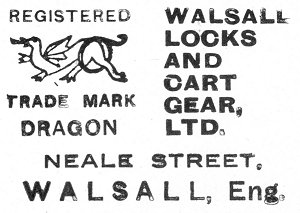 |
This notice, from the
Ironmonger Guide 1950 trade marks section, shows a dragon trade
mark. |
| The Dreadnought padlock, patented 1895, when the
company was going under the name Walsall Locks & Cart Gear Ltd..
The key on this remarkable lock fitted over the bars on the
front of the lock and was then moved sideways to open the lock.
Courtesy of the Locksmith's House. |
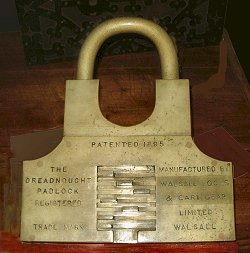 |
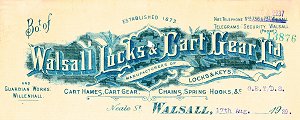 |
A 1929 letterhead. Courtesy
of
Trevor Dowson. |
They built premises in Neale Street, Walsall and later
expanded to having branches at Walsall Road, Willenhall (used until the
1960s) and Newhall Street, Willenhall. (In 1936 they were at
Newhall Street, only closed earlier).
|

|
In the 1920s they expanded their range to
include a cylinder pin tumbler night latch, which was sold under
the ZENI brand name. They also used the ACE brand.
|
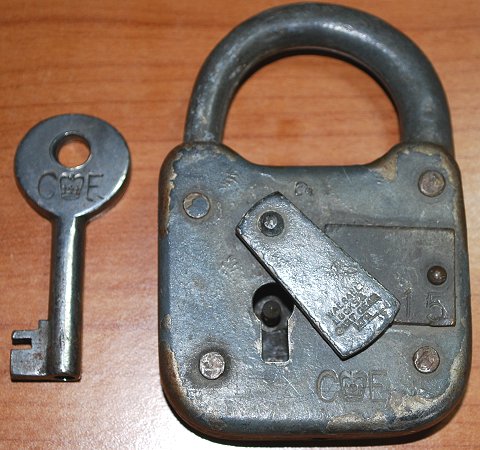 |
A Walsall Locks & Cart Gear
padlock. Courtesy of Nigel. |
| In 1975 they changed their name to Walsall Locks
Ltd, as they were then only making a few items for the
equestrian trade. They went into liquidation in 1985, when
employing 85 people. A dividend of 46 pence in the pound
was paid to creditors. The lock making part was taken over
by Len Bates (who was the "B" in ABT Hardware) and Paul Preece,
who formed Walsall Lock and Hardware Ltd and moved into new
premises at Leamore Close, Leamore Industrial Estate, Walsall,
on the 10 February 1986. They continued to make a small
part of the original range of padlocks.
On the 1st April 1997 they changed the name to
Walsall Locks Limited. This was felt to describe the
activities of the company and reflect the identity that they had
built up within the industry. They manufactured ZENI and
ACE padlocks, while importing mortice and safe locks for resale.
(LMNL No 28)
|
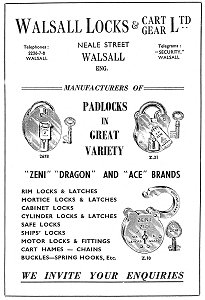
An advert from 1955. Courtesy of Trevor Dowson. |
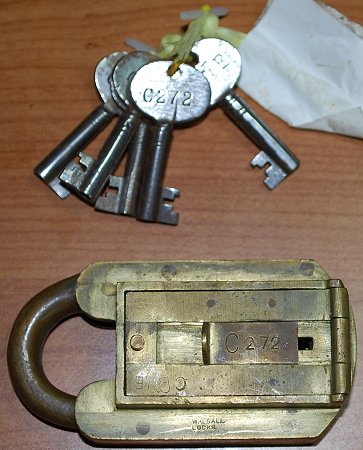 |
A Walsall Locks Limited brass padlock.
Courtesy of Nigel. |
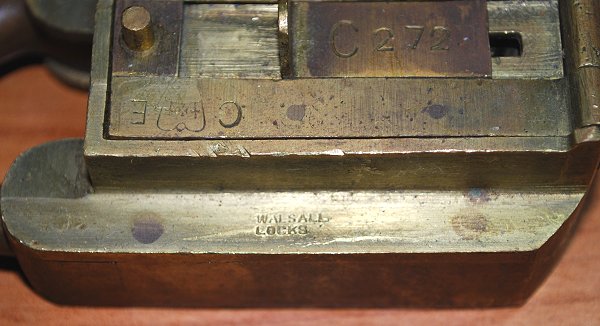
A close-up view of the above padlock. Courtesy
of Nigel.
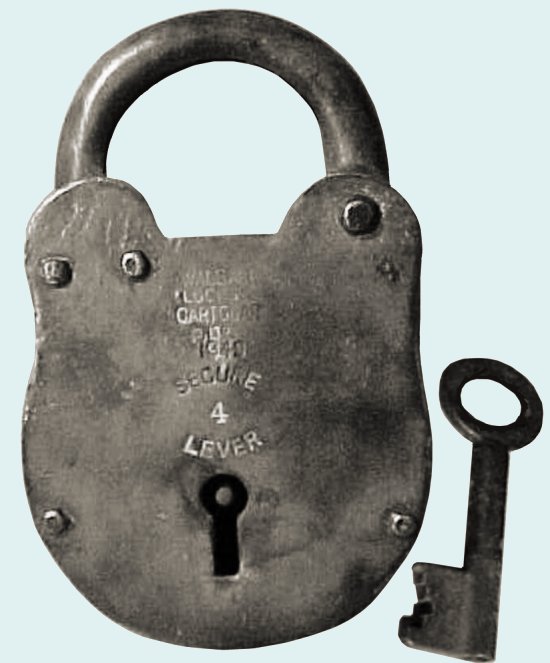
A Walsall Locks padlock from 1949.
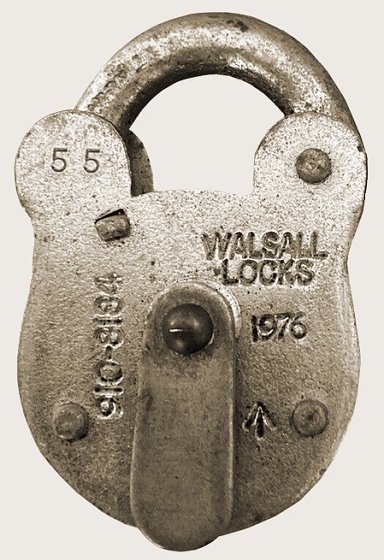
A Walsall Locks padlock from 1976.
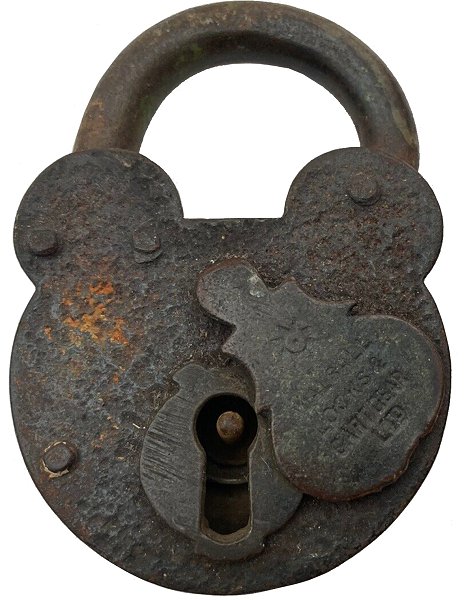
A Walsall Locks & Cart Gear
padlock.
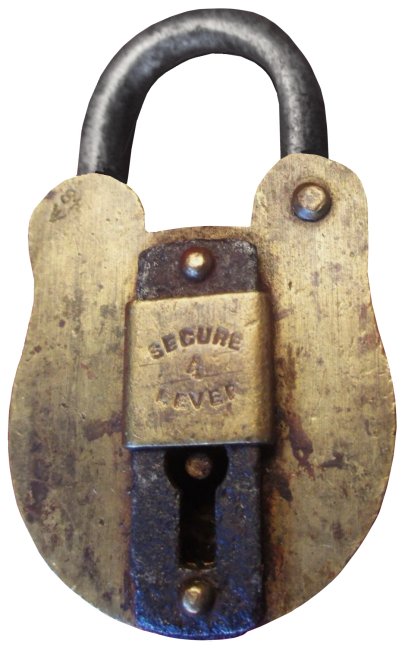
A Walsall Locks & Cart Gear
padlock.
B. & P. WALTERS, 100 NORTH STREET, WOLVERHAMPTON. Also
BENJAMIN WALTERS AND CO. LTD. 24 NORTH STREET, WOLVERHAMPTON.
|
An advert from 1851.
|
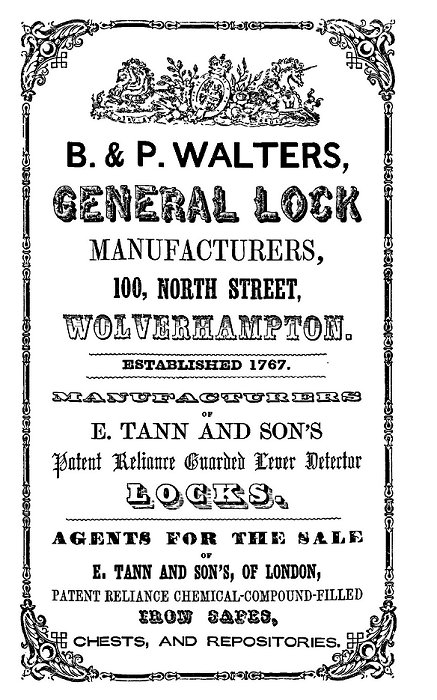 |
Tony Beck has kindly provided the following photos of a
lock marked "B & P Walters".
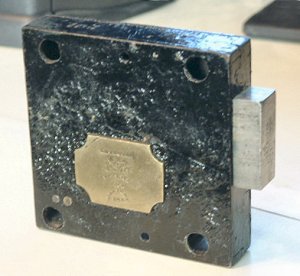 |
A safe lock with "detecter", from the Victorian
period, by B & P Walters (from Tony Beck's collection". |
|
A close-up view of the brass plate from the safe lock
above. |
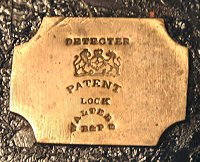 |
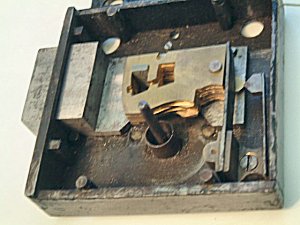 |
The interior of the safe lock above. |
I must thank Jo Barreiro for the following information.
She has researched both companies.
A long list of local tradesmen in the Wolverhampton
Chronicle and Staffordshire Advertiser, published on Wednesday the 12th
June, 1844 includes Benjamin Walters, lock manufacturer.
There is a mention of a new patent taken out by Benjamin Walters, of
Wolverhampton, for improvements in spindles for locks and latches, and
the means of adjusting knobs to suit any thickness of door. Dated July
3rd, 1854. It is listed in the Birmingham Journal, on Saturday 6th
January, 1855.
In 1856, Benjamin Walters, 100 North Street, is listed as agent for E.
Tann & Sons. The address confirms that the initial 'B' in B & P Walters,
is Benjamin.
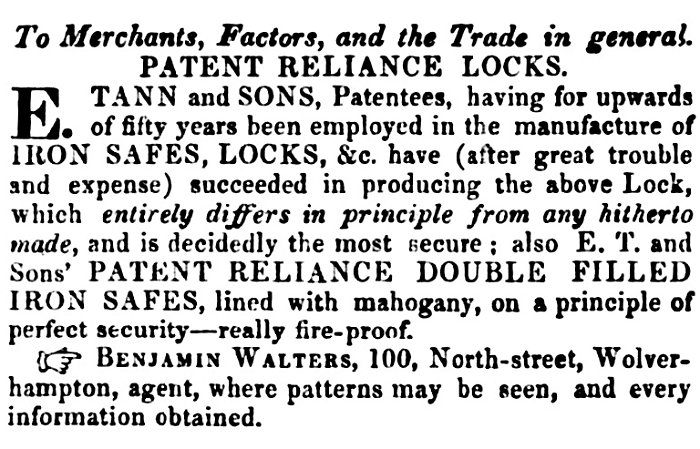
From the Wolverhampton Chronicle and
Staffordshire Advertiser, Wednesday the 1st January, 1845.
Courtesy of Jo Barreiro. |
In 1863 there were two
articles about an assault on Benjamin Walters, lock manufacturer, of
North Street, by his brother Philip Walters, former auctioneer. This
suggests that the initial 'P' in B & P Walters, could be Philip. The
articles are in the Staffordshire Advertiser, Saturday 27th June, 1863
and the Birmingham Daily Gazette, Tuesday 23rd June, 1863.
The following article from 1862 records how Benjamin was
shot in a shooting accident. The article also states that his home was
at Albrighton and that he was a sergeant in Lord Dartmouth's Patshull
Company.
|
Unfortunate Accident at a Rifle
Match
A match has
taken place at Earl Dartmouth’s
Range between North and South
Staffordshire. The North scored a
total of 368, and the South marked
920. After dinner the competitors
assembled at the 600 yards’ range
for the purpose of shooting seven
shots each at a distance, when a
most lamentable accident occurred. A
number of men, we believe on both
sides, snapped off caps, some of
them taking aim at the targets, with
a view, probably, to see if they
were steady.
At this time
there were half a dozen of the
markers at the targets, re-painting
them ready for firing, and one of
these, Mr. Benjamin Walters,
lock-manufacturer, of North Street,
Wolverhampton, who resides at
Albrighton, and is a sergeant in
Lord Dartmouth’s Patshull Company,
was shot with a bullet, which
striking him on the left side,
passed through the flesh near the
ribs, and through the flesh of the
arm, striking the centre of the
target. This shot was fired by
Sergeant Bowker, of the Trysull
Company.
At the target
with Mr. Walters was a gentleman who
at once stripped Mr. Walters and
adopted means to stop the bleeding,
which was considerable. Great
consternation was naturally
occasioned amongst the large number
of spectators then assembled, and
two horsemen at once galloped off to
the butt, their turn being awaited
with intense anxiety, as beyond
seeing the unfortunate gentleman
fall and bearing a scream, the
result of the accident was unknown.
It was most
satisfactory to find that he was
living, and Mr. Hopkins, a medical
man, and Mr. Beck, who was
apprenticed to a surgeon, were soon
in attendance on him, and he was
conveyed in a carriage, first to
Patshull Hall, and afterwards to his
residence.
We are happy to know that he passed
a good night, and it is hoped that
he is now in a fair way of recovery.
Of course, had the shot struck about
an inch more to the right, it would,
in all probability, have at once
been fatal. A small artery in the
arm was injured and the main artery
just missed. The affair was purely
accidental. |
|
|
|
From the
Loughborough Monitor, Thursday the 25th September, 1862.
Courtesy of Jo Barreiro. |
The following newspaper article states that in 1900 the
company was sold along with the trading name, to J. Woodward and N. F.
Thompson, trading as Benjamin Walters & Co., North Street,
Wolverhampton.
|
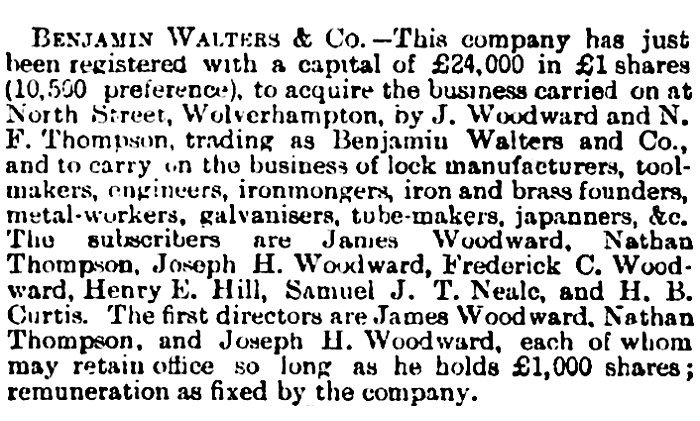
From the Birmingham Daily Post, Tuesday
the 3rd July, 1900. Courtesy of Jo Barreiro. |
The firm was listed as general lock makers, of all kinds of rim and mortice
locks and latches, combination and night latches, and every description of
brass and iron cabinet locks. Also Bales & Walters improved patent
locks and latches. They made their own cabinet locks and Bales latches
but acted as wholesale factors for many other types.
They are listed as being at 154 North Street in 1956 and by
1960 were situated upstairs at 24 North Street, opposite the Molineux Hotel. The business closed when the premises were required for the
building of the Wolverhampton ring road.
W.B.S. SAFE LOCKS LTD. HART ROAD, WEDNESFIELD
|
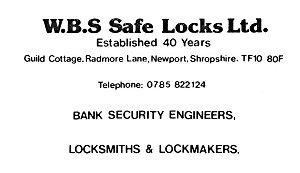
|
W.B.S. Safe Locks was founded by
William Bernard Sidbotham during 1946.
He rented a small workshop in
Vale Place, Merridale Street, Wolverhampton. The
rent was eight shillings per week (40p in today's currency). At this
time he had one employee and went on to employ another three later,
including his son.
|
His first order was for a trial for a
small quantity of locks from the safe makers, Samuel Withers & Co. Ltd.
(q.v.) for whom he became the main supplier of locks for their
safes.
During the early 1950s he bought
premises at 38 Hart Road, Wednesfield, nr. Wolverhampton where he formed
a limited company and became W.B.S. Safe Locks Ltd.
After being demobbed from the army in
January 1948 his son, K.W. Sidbotham, went to learn the art of making
locks, the old way by hand, under his father’s teaching. They
specialised in the making of locks for safes and many other types of
securities, of which bank work was their speciality.
K.W. Sidbotham ran the firm when his
father left and under him the firm expanded considerably. In
particular they went on to repair and install safes and strong room
doors, working for banks, police forces, prisons and other places using
safes and high security doors. During 1960 the firm became involved in
the making of rackbolt locks, which turned out to be a vital string to
his bow when Bob Sidbotham moved to the Guild Cottage, Radmore Lane,
Newport Salop, from where he ran his business and worked his trade for
twenty five years. The rackbolt lock was made for a London company of
locksmiths for a refurbishment programme, service work included, for one
of the leading High Street banks.
This order lasted about thirty years
after which Mr. K.W. Sidbotham retired from lock making, due to poor
health. His cousin, Mr. K. Rooker, of Regent Safe & Cabinet Locks,
Willenhall, (q.v.) helped out and they worked together very well.
We are obliged to Mr. K. W. Sidbotham for
help with the above entry. A book by him gives further details of the
company as well as a picture of the working conditions and practices of a
locksmith in the second half of the twentieth century: K. W. "Bob"
Sidbotham, Life and Tales of a Locksmith, History into Print, 2005, £9.95.
ENOCH WEBSTER, CHAPEL GREEN WORKS, WILLENHALL
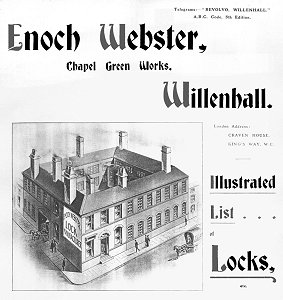 |
Manufacturers of mortice and rim locks.
Established in the second half of the 1800s.
In 1881 Enoch
Webster, aged 41, lived at 18 Cannon Street and is listed as a
lock manufacturer, employing 1 man and 4 boys.
The inside
of all the parts in their locks were marked with a logo: E.W.W.
in a triangle |
WEISER (UK) LTD. NORTH WEST INDUSTRIAL ESTATE, PETERLEE,
COUNTY DURHAM
The UK branch of a USA company who set up in Peterlee to
manufacture their range of pin tumbler locks in the UK. They also
had a branch in Sint-Niklaas, Belgium. Closed in the early 1990s
when demand decreased and production was transferred to Belgium.
WEST ALLOY DIECASTINGS LTD. GARTH ROAD, MORDEN,
SURREY
West Alloy Diecastings is a privately owned company founded in 1952.
The company began as a trade shop, producing zinc diecastings, and
fairly quickly moved into the design and manufacture of locks, enjoying
considerable success with a main lock for caravans. Further
versions developed and the success of the design can be measured by the
fact that three of these assemblies are still in current production.
By the 1960s West Alloy was also manufacturing hinges, drawer pulls,
catches and folding table legs. When fuel economy became a major
issue in the seventies, West Alloy responded by introducing a design of
lock predominately manufactured in plastic. Retaining one or two
zinc castings, the change to plastic reduced the weight by 60 to 70%.
It was this change that opened the door to other market opportunities.
In the early eighties West Alloy identified a market opportunity and
set about designing a purpose built lock for tractor cabs, based on
locking round a stud rather than on the traditional slam type lock used
by the caravan industry, the major market for the company’s locks at
that time. The resulting design was a much stronger interior lock,
produced predominately from steel pressings - a considerable departure
from the original core business of zinc diecasting. Introduced in
1984 the tractor cab lock was designed to operate with an existing
diecast exterior and incorporated a diecast operating lever to enable
the door to be opened from the inside. At the time it wasn’t fully
appreciated how flexible and successful this design would become and
that it would lead to several new generations of products.
West Alloy currently produce a wide range of parts for construction
equipment and tractor cabs, caravans, garage doors and office furniture.
The majority of products are West Alloy’s own design and are
manufactured at the company’s two factories at Morden and Sutton,
Surrey. The company employs a work force of ninety and is equipped
with all the necessary equipment for producing diecastings and plastic
mouldings. Approximately 65% of the company’s products are for the
U.K. market, the balance being exported to Europe, Australia, South
Africa, Japan and the U.S.A.
In 1998 Mr B Sugden was the Managing Director. The firm had 86
employees. Their turnover was £4 million.
WEST END LOCK CO. NEW ROAD, WILLENHALL
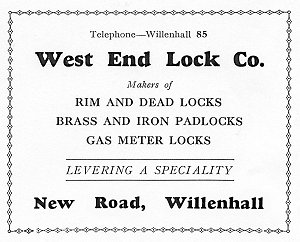 |
Makers of rim and dead locks, brass and iron
padlocks, and gas meter locks. In existence in 1921 and
1974 but not 1914. Closed in 1970s.
|
WESTON BODY HARDWARE LTD, 27 WALKER ROAD, REDDITCH
Manufacturers of die cast lock cylinder barrels, budget locks,
compartment locks. Set up in the 1970s to manufacture the
"Wilmot Breedon" range of locks and latches when Josiah Parkes decided
they did not wish to continue to produce the range they had made for
Wilmot Breeden for so many years.

|

|
| Return to
Locks and Safes |
Return to
the list of makers |
|